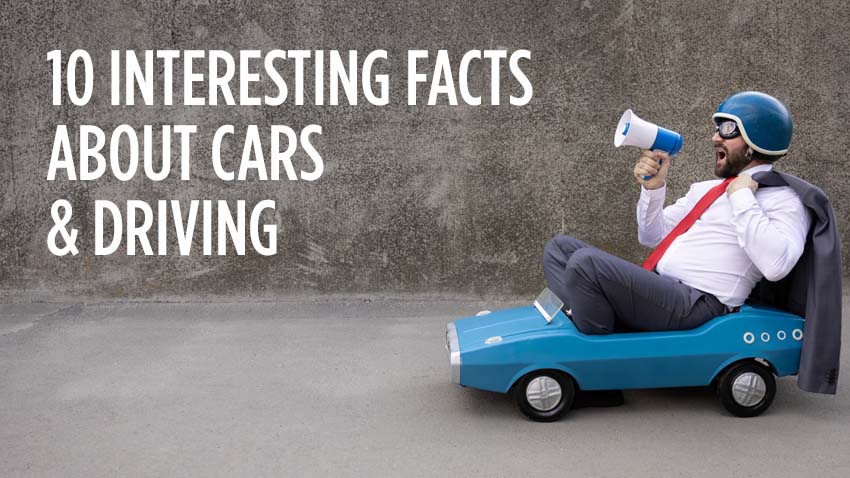
Trivia is everywhere from TV quiz shows to viral top-ten lists on social media. It seems that everyone loves a bit of useless information. Of course, we're always eager to give people what they want.
-
The first petrol-driven car
Was the famous Ford Model T, right?
Nope, that's a fairly common misconception but it's not the case. Some of you are looking a little smug out there, so clearly not everyone is taken in by the Model T's fame, but do you know which was the first petrol-powered car?
The invention of the world's first petrol/gasoline-fueled vehicle is attributed to Germany's legendary Carl Benz. On 29 January 1886, Carl Benz applied to patent a "vehicle powered by a gas engine". When the patent was approved, the application date became the official patent date for the invention. Benz's car made its first public appearance in July of that year.
That first, historic Benz petrol vehicle bore little resemblance to those that would come later, and it looked more like a fancy tricycle than anything we'd recognise as a car. Furthermore, its top speed of 16km/h would be a walk in the park to Usain Bolt. But the fact remains, the invention changed the world.
-
The first mass-produced car
So this accolade famously belongs to the Ford, right?
Sorry, but that wasn't the Model T either. Carl Benz, whom we met earlier, can also claim responsibility for the first mass production of vehicles in any kind of volume. Not only was the Benz Velo mass-produced before the end of the 19th century, it also had four wheels rather than three and so looked a lot more like a real car than Benz's original effort.
America's Oldsmobile also managed to mass produce a car before Ford. Where Henry Ford made a difference was in transforming mass production into a modern, efficient process using the assembly line model still seen today. Ford's Model T could be provided in large numbers at an affordable price. Benz may have invented the car but Ford kick-started it on its journey to world domination.
-
There are a lot of cars in the world
This is a great one for illustrating the speed of human progress. As we've seen, the car was invented less than 140 years ago. Bear that in mind when you consider that estimates put the number of cars on the world's roads in 2024 at 1.47 billion. That's one car for every 5.5 people.
We daren't even think about how many cars must have been built in total since 1886.
-
The world's most expensive car
In 2024, the world's most expensive new car is the £25 million Rolls-Royce La Rose Noire Droptail, one of two Rollers that would set you back over £20 million each. The other is the Rolls-Royce Boat Tail. "Hooray!" We hear you cheer. "At last, a title not held by Carl Benz!" Well, that's right. We almost hesitate to point out that Rolls-Royce is now owned by BMW, another German name. The other thing we hesitate to mention is that the single most expensive car ever sold was a 1955 Mercedes-Benz 300 SLR Uhlenhaut Coupé for which someone paid £114 million in 2022. Sorry, there's that Benz name again...
-
The world's most expensive car number plate
Some people are amazed when they hear how much money someone is prepared to pay for their dream personalised number plate. The UK record is just over £500,000 paid by classic Ferrari Dealer John Collins (at least, that's the highest price that is in the public domain and that we're allowed to share).
Anyone who finds that shocking should probably sit down with a nice cup of tea, or brandy, before reading the next bit.
The most expensive number plate in the world is currently the Dubai number P 7*, which sold at auction for the equivalent of £12 million in 2023. This is just one of several UAE plates that have sold for more than £1 million GBP.
(* "P" is the series identifier, and only appears in small print on the left of the plate. The actual registration number is just the digit "7").
-
The most popular car of all time
In terms of sales and volume produced the most popular car ever made is the Toyota Corolla. Since its introduction in 1966, the Corolla has sold over 50 million units.
As well as being sold bearing the Toyota brand, versions of the Corolla also appear in other guises. The Suzuki Swace is basically a Corolla with a facelift and other rebadged Corollas, or variants thereof, have been sold by Chevrolet and Daihatsu amongst others at various times.
-
The safest (and dodgiest) places to drive in Europe
According to a study by Vignetteswitzerland.com, based on data from the European Transport Safety Council, Norway is the safest place in Europe to drive. That's based on the number of deaths per million people due to road accidents. With 21.28 fatalities per million in 2022, Norwegian road users must feel rather safer than their Romanian counterparts. Romania is statistically the least safe place to drive, with 85.81 deaths per million.
The second safest place is Sweden, while the UK is ranked as the third safest place to drive in Europe, with 25.89 deaths per million. While that's pretty good, relatively speaking, it's also quite difficult to believe if you've ever driven in London.
-
The worst place to be a criminal getaway driver
This must surely be Dubai. Reportedly, the Dubai police department has more than a dozen supercars at its disposal, including the Bugatti Veyron, which has a top recorded speed of over 260 mph. If response times are as impressive as their vehicle specs, then that may go some way to explaining why Dubai has an extremely low crime rate.
-
VW sells more sausages than cars
No, we're not joking and we haven't been drinking. Car maker Volkswagen is also sausage maker Volkswagen. It may not be the most obvious pairing of products from a single company but it has worked out very nicely.
VW has been making its critically acclaimed currywurst sausage since 1973. As well as being highly rated by sausage experts, the product is an excellent seller and VW now makes more sausages than cars. If you feel like trying it yourself, order VW part number 199 398 500 A. No, honestly: that really is it's VW part number.
-
The average car has around 30,000 parts
If you were to completely dismantle a modern car and then count the parts the total really would be in the vicinity of 30,000. That's including screws, bolts, wires and all the rest.
Disclaimer: Regtransfers does not recommend completely dismantling your car, or anyone else's. There is really no sensible reason to do so, and lots of sensible reasons not to. One reason is the probability that when you reassemble it, you will find that you have a few bits left over - much like self-assembly furniture.
Want more?
Check out our fun and games section to find more interesting trivia and facts about cars, number plates & driving.
